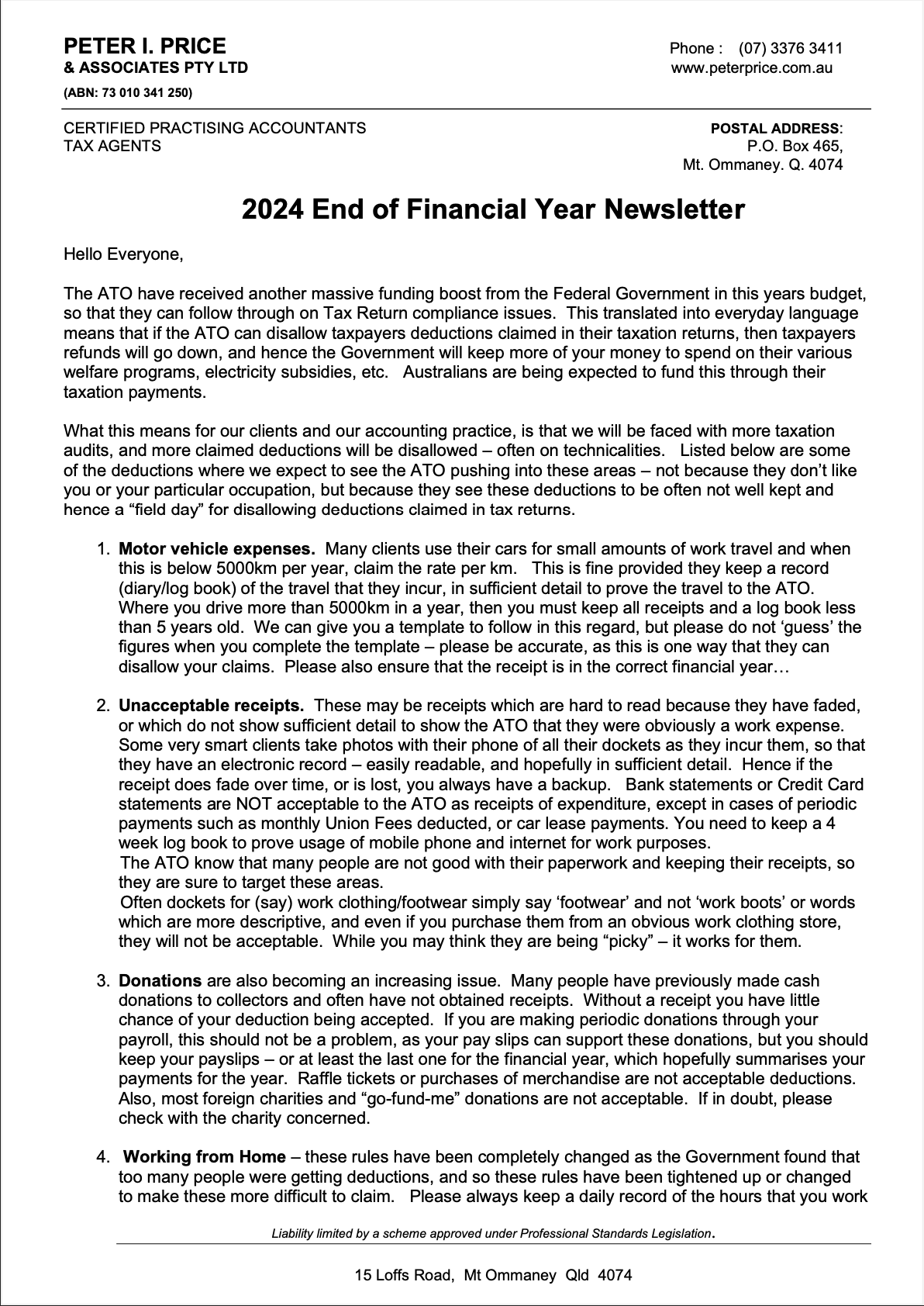WORKING FROM HOME EXPENSES FOR 2023

.
CHANGES FOR 2023
To be eligible to claim a deduction for working from home expenses, you must:
- incur additional running expenses as a result of working from home
- be working from home to fulfil your employment duties, not just completing minimal tasks
- keep records at the time you work to prove you incur the cost.
To calculate your working-from-home expenses, you can use the revised fixed rate method or the actual cost method.
REVISED FIXED RATE METHOD
The revised fixed rate method allows you to claim 67 cents per hour you work from home for the expenses listed below. You no longer require a dedicated home office to use this method.
Expenses included in the revised fixed rate are:
- data and internet
- mobile and home phone usage
- electricity and gas
- computer consumables (e.g. printer ink)
- stationery.
You can’t claim a separate deduction for any of the expenses the revised fixed rate includes.
You can claim a separate deduction for:
- the decline in value of assets used while working from home, such as computers and office furniture
- the repairs and maintenance of these assets
- cleaning (only if you have a dedicated home office).
ACTUAL COST METHOD
The actual cost method allows you to claim a deduction for the actual expenses you incur as a result of working from home.
You may be able to claim a deduction for each of the expenses you incur, such as:
- data and internet
- mobile and home phone usage
- electricity and gas
- computer consumables (e.g. printer ink)
- stationery
- the decline in value of assets used while working from home, such as computers and office furniture, as well as any maintenance and repairs of these items
- cleaning (only if you have a dedicated home office).
The actual cost method requires detailed calculations and records. For example, you will need to know and have records of the cost per unit of electricity and the average units used per hour.
These shortcut arrangements do not prohibit people from making a working-from-home claim under existing arrangements, where you calculate all or part of your running expenses.
The ATO will review the special arrangement for the next financial year as the COVID-19 situation progresses.
RECORD KEEPING CHECKLIST
Revised Fixed Rate Method
You will need the following records:
- a record of all the hours you work from home for the entire year (e.g. a timesheet, roster, diary or similar document)
- evidence you paid for the expenses covered by the revised fixed rate method (for example, if you use your phone and electricity when you work from home, keep one bill for each of these expenses).
You will also need records for items you claim as a separate deduction.
From 1 July 2022 to 28 February 2023, the ATO accept a record which represents the total number of hours worked from home (for example a 4 week diary).
From 1 March 2023 onwards, a record of all the hours you worked from home is required.
Actual Cost Method
You will need to keep a record for every expense you claim.
Also, you need the following evidence to show you have incurred additional running expenses:
- receipts, bills or invoices which show the supplier, amount of the expense, nature of the goods, date it was paid and the date of the document
- evidence of your personal and work-related use of the items or services you buy and use.
You can work out your work-related expenses using records for the entire year or over a 4-week period that represents your work use – for example, using a diary or itemised bill.
Decline in Value of Assets and Equipment
You will need records for depreciating assets, that show:
- when and where you buy the item and its cost
- when you started using the item for a work-related purpose
- how you work out your percentage of work-related use, such as a diary that shows the purpose of and use of the item for work
- either:
- a copy of the Commissioner’s Determination of Effective Life you use to work out the decline in value.
- how you work out the effective life if you don’t use the Commissioner’s determination.
- which method you choose to work out the decline in value
OCCUPANCY EXPENSES
Claims for occupancy expenses are allowed only if the home is used as a place of business. Occupancy expenses include rent, mortgage interest, water rates, repairs, house insurance premiums.
The claim can be made as an apportionment of total expenses incurred on a floor area basis.
Warning: Being able to claim theses expenses may affect your ‘main residence exemption’ for capital gains tax purposes if you sell your house in the future.
WHEN IS A HOME A PLACE OF BUSINESS?
The following factors, none of which is necessarily conclusive on its own, may indicate whether, or not, an area set aside has the characteristics of a place of business:
- the area is clearly identifiable as a place of business
- the area is not readily suitable or adaptable for use for private or domestic purposes in association with the home generally
- the area is used exclusively, or almost exclusively, for carrying on a business, or
- the area is used regularly for client or customer visits.
If you use your home to carry out income-producing activities as a matter of convenience, you are not entitled to a deduction for occupancy expenses. It would be rare for an employee to be able to claim occupancy expenses.

